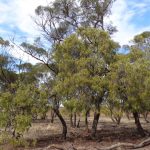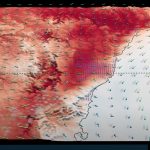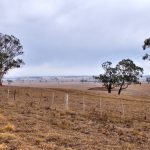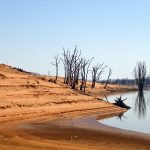 September 17, 2021 11:13 am
Published by Climate Extremes
September 17, 2021 11:13 am
Published by Climate Extremes
CLEX researchers and colleagues used a land-surface model that considered groundwater dynamics to explain how groundwater sustains transpiration and eases plant heat pressure during the heatwaves that occurred during the Millennium Drought and the 2017-2019 severe drought over southeast Australia.
 July 19, 2021 4:05 pm
Published by Climate Extremes
July 19, 2021 4:05 pm
Published by Climate Extremes
CLEX researchers and colleagues combined high-resolution regional climate projections with a process-based hazelnut simulation model to predict future hazelnut yield in Australia.
 July 14, 2021 1:46 pm
Published by Climate Extremes
July 14, 2021 1:46 pm
Published by Climate Extremes
This research uses Sydney, Australia’s largest city, as a test case for our new configuration of the Weather and Research Forecasting model run at a very high resolution of 800 m with a new urban classification scheme that describes the complexity of Sydney’s built environment.
 July 14, 2021 1:23 pm
Published by Climate Extremes
July 14, 2021 1:23 pm
Published by Climate Extremes
In this study, CLEX researchers and colleagues showed that the North Atlantic sea-surface temperature response to ENSO is nonlinear with respect to the strength of the sea-surface temperature forcing in the tropical Pacific.
 May 6, 2021 1:58 pm
Published by Climate Extremes
May 6, 2021 1:58 pm
Published by Climate Extremes
In this study, CLEX researchers aimed to evaluate the effect of different sources of data and the uncertainties in satellite data, by comparing the data with a ground-based radar product using both location-based and storm-based approaches.
 April 30, 2021 12:16 pm
Published by Climate Extremes
April 30, 2021 12:16 pm
Published by Climate Extremes
Different expressions of El Niño do affect interannual variability in the terrestrial carbon cycle. However, the effect over longer timescales is small. This means the changing frequency of these two types of El Niño events may be of little importance in terms of robustly simulating the future terrestrial carbon cycle.
 April 12, 2021 4:02 pm
Published by Climate Extremes
April 12, 2021 4:02 pm
Published by Climate Extremes
Until now, flash drought research has been on the regional scale and has been limited to observations and reanalyses. CLEX researchers have been the first to examine flash drought in climate models.
 March 18, 2021 1:16 pm
Published by Climate Extremes
March 18, 2021 1:16 pm
Published by Climate Extremes
This research around central Pacific El Niños is important for agricultural and water resources planning efforts in the Murray Darling Basin region and may help with seasonal prediction efforts to predict drought‐breaking rain such as occurred in early 2020.
 February 15, 2021 1:22 pm
Published by Climate Extremes
February 15, 2021 1:22 pm
Published by Climate Extremes
There is a great deal of misuse of climate model projections emerging in business. Climate models are being used for some purposes that are simply inappropriate leading to assessments of the physical risks to business that are of no value. However, there are ways to use climate model data that has value and can help business robustly assess some specific climate related risks.
 February 12, 2021 2:05 pm
Published by Climate Extremes
February 12, 2021 2:05 pm
Published by Climate Extremes
In this study, the researchers propose a reporting format for leaf-level gas exchange data and metadata to provide guidance to data contributors on how to store data in repositories to maximise their discoverability, facilitate their efficient reuse, and add value to individual datasets.










